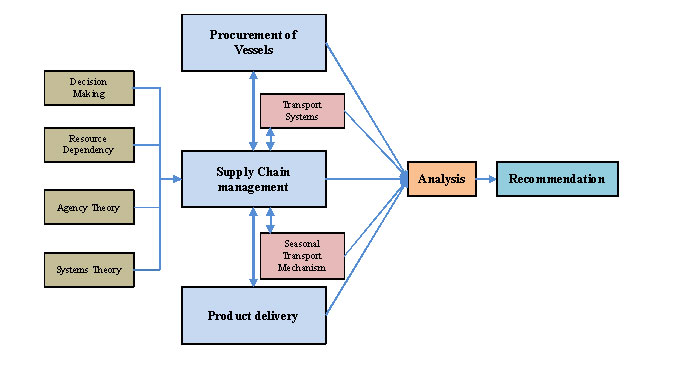The US and the UK Master’s Part / Chapter-wise Dissertation Writing Service

Then You’ve Certainly Reached the Right place
Designing a cost-effective Supply chain requirements of Offshore Installations in the North Caspian Sea
Introduction
The following proposal presents an overview of the research. It begins with the information of the company, North Caspian Operating Company (NCOC) followed by the problem analysis and statement of the problem. From this, the research objectives and research questions are set which further determine how the study is carried out (methodology). The proposal further discusses the relevance of effective supply chain by designing a supply chain portfolio for offshore installations in the North East Caspian Sea.
1.1 Company Information
The North Caspian Operating Company (NCOC), located in Kazakhstan, is a joint venture organisation which operates under the purview of the North Caspian Sea Production Sharing Agreement (NCSPSA) in the oil and gas sector. The organisation works in conjunction with companies such as Shell, Eni, Exxon, Total, Cnpc, Inpex, and KazMunay gas. The NCSPSA in this regard has a large Kashagan offshore field that is located eighty kilometres to the southeast of Atyrau, in the Caspian Sea. This Kashagan shore has been involved in the discovery of hydrocarbons since the 1960’s and has also been deemed the oldest petroleum development for the region of Kazakhstan. With this, the country has global acclaim as it has become one of the main petroleum-producing regions in the world. While Kashagan occupies 5,600 square kilometres of the NCSPSA, the Kalamkas, Akotte and Kairan fields too form a part of the same. More recently, however, the size of Kashagan has been altered to 75x45kilometers per square, which is equivalent to the size of London. It has been stated that this field alone can produce close to 1.5 million barrels of oil per day or a total of 35 billion barrels of which 11 billion barrels go to NCOC as a result of their venture.
1.2 Problem Analysis
There are major limitations that exist in the oil and gas industry such as those related to low oil price, size and complexity of the operations in the global petroleum industries. Due to such imbalances, the industry is now challenged with maintaining supply chains in a cost effective manner Other factors are the dip in temperature levels in the winter season (-400C) and a sharp rise in the summer (+400C); during the winter it can become quite challenging as the access to the marine becomes restricted due to the blockade as water remains frozen at this time. Furthermore, the severe frosts and the low depth of the required part the Caspian makes access again more challenging. Due to this, the company is hence forced to charter special icebreakers with barges for operation in this area during the winter time. Now the main problem that exists is that icebreakers are neither readily nor easily available in this area. This is mainly attributed to the fact that the only way that is in and out of the North East Caspian is through the Volga-Don canal system, which remains closed in the winter and makes the need and hires for icebreakers even more expensive. In view of this, the shipping companies agree to bring in icebreakers only for identified work and rent them only for a period of 12 months. What again makes them more expensive here is that icebreakers are only required for a period of four months while for eight months they lie idle. Therefore, while procurement of the vessel itself poses a challenge, the main struggle here will be both the cost for procurement as well as the cost of maintenance. Even if procurement can be achieved to some extent, the cost of maintaining an icebreaker without activity for a period of eight months does pose an expensive challenge. This, in turn, further, relates to the cost-effectiveness of executing the logistics process as the idle icebreaker only adds to the cost without the increase in the efficiency, but maintaining a cost effective supply chain is a prime requisite to gaining an appropriate competitive edge in the oil and gas industry.
1.3 Problem Statement
From the analysis above it can be stated that the main problem seen here is the cost effectiveness of the logistics activities of the supply chain. This is especially relevant as the company has to make decisions that affect the cost, either way, to ensure the supply chain is adequately continued.
Conceptual Design
In this chapter, the author formulates a research objective, research framework and research questions.
2.1 Research Objective
The research objective is to explore how effective the current supply chain management is by analysing the process of the SCM related to logistics activities and to make recommendations to NCOC on how to improve their supply chain requirements.
2.2 Research Framework

The very first stage of the framework refers to the theories of sociology applicable here such as organizational decision making, resource dependency theory, agency theory and systems theory. These theories will enable for better understanding the process of supply chain management. The next stage involves the data collection and discussion of areas such as procurement of vessels, transport systems, seasonal transport and eventual supply while the next stage is to analyse the same. Lastly, a framework is designed to ensure better management of the supply chain by making recommendations to that effect.
2.3 Research questions
Main question
What criteria are relevant for the improvement of efficiency of the SCM at NCOC?
Theoretical questions
What strategies can be formulated by using the theories of decision making, agency theory, systems theory and the resource dependence theory?
- What are the procurement, and supply procedures for off shore installations in the oil and gas industry?
- What are the logistics procedures for off shore installations in the oil and gas industry?
- What are the supply chain management issues in the offshore operations of oil and gas industry?
Empirical questions
What are the problematic areas of the logistics division in the supply chain management at NCOC?
- What are the current issues faced by NCOC in SCM of offshore operations/activities?
- What is the role of supply vessels in off shore logistics at NCOC?
- What are the main strategies employed for the procurement of vessels at NCOC
- What is the gap that exists between procurement of vessels and product delivery and the solution for better effectiveness of the SCM process?
Literature review
For the literature available on supply chain management, it has been projected that theory has been in use in a fragmented manner. The most common theories used in the context of Supply Chain Management (SCM) hence include organisational decision making, resource dependency theory, agency theory and systems theory. In order to effectively classify each of these theories, it has been suggested by Möller's (2013) that SCM is an arena which is characterised by a multitude of layers which consist of one actor, organisation, team, or industry. Giannakis and Croom's (2004) on the other hand are of the view that SCM is based on synthesis, synergy and synchronisation along with the multitude of activities for an SCM. The categorisation that is hence emergent here are the buying behaviour of an organisation, contracting economics, inter-organisational relations and integrated SCM.
3.1 Buying behaviour of an organisation (Decision-Making Theory)
This aspect of the categorisation is based on the concepts of organisational sociology and hence core decision making. The main basis of such a theory is that politics within the organisation is almost inevitable as it is assumed here that the actors make decisions that are rational as they have varying perspectives as well as motivations. This leads to the conflict as the decision making then becomes cumulative (March and Simon, 1958). As this process is one that has more than one agenda, it can be considered as the primary source for intra-organisational politics which thereby assesses the role that power can play in the resolution of conflict (Kohli, 1989; Pettigrew, 1973; Ronchetto et al., 1989; Ryan and Holbrook, 1982; Smeltzer and Goel, 1995). In view of this, decisions such as what to purchase, making specifications, and choice of suppliers including the bid to obtain them are most commonly viewed as political decisions rather than technical. In this regard, it can be mentioned that conflicts can be resolved without the use of power but rather by employing problem-solving techniques (Sheth, 1973). The supply chain management issues and the procedures for procurement of vessels as well as the logistics on the whole can thus be evaluated by applying the decision making theory to the same. This can further provide valuable insights on the purchasing behaviour as well as the cost management of using the vessels procured that further provide an insight on achieving performance at NCOC.
3.2 Contracting economics (Agency Theory)
Contracting economics draws primarily from the agency theory. Agency theory refers to the scenario wherein the principal is in charge of delegating responsibility to the agent. Here, the delegation should be done in such a manner as to protect the interest of the principal rather than the agent (Jensen and Meckling, 1976) . Agency theory hence is most widely appreciated for its comprehension of the issues surrounding ownership and control that can occur in an organisation where the managers are the agents of their owners (Eisenhardt, 1989; Fama and Jensen, 1983). Within the purview of the SCM however, the principal-agent relationship refers to the buyer- supplier relationship (Hart, 2003; Klein, 1996; Klein et al., 1978). In this case, therefore, contracting economics can be referred to as issues that arise between the buyer and the seller, where the objective is effective management of all transactions (Williamson, 1985). Here again, the examination of both the logistics as well as the management of the supply chain may be evaluated.

Researchers to mentor-We write your Assignments & Dissertation
With our team of researchers & Statisticians - Tutors India guarantees your grade & acceptance!
About service3.3 Inter-organisational relations (Resource Dependency Theory)
The industrial network approach is the main association to inter-organisational relations. This can be evidenced by the use of resource dependence theory (Pfeffer and Salancik, 1978). This refers to a spirited relation between the buyers and the sellers over a period of time that leads to building most trusted relations. Here the interaction may be part of a large network of relations. The resource dependency theory in this regard depicts how organisations are dependent on other firms for resources such as goods, services or raw materials for their overall success in the industry (Aldrich, 1979; Pfeffer and Salancik, 1978). Here it is therefore assumed that these relations are a part of a large existing network that not only deals with the exchange of resource but also in the creating of new (Håkansson and Ford, 2002). In this manner of examination the procurement and supply procedures for off shore installations in the oil and gas may be carried out specifically with respect to resource dependence.
3.4 Integrated SCM (Systems Theory)
Systems theory initially came into existence in the contexts of physics and biology but was eventually incorporated into the contexts of management and organisation, to explain the relationships that exist between organisations. For this case, it is assumed to be a supply network within an organisation. An integrated SCM, therefore, it has been stated that the supply network is not to be viewed as a component but rather as a whole process of the organisation so that the supply chain may be effectively managed (Von Bertalanffy, 1950). Within the scope of the systems theory, the issues of the management of SC may be adequately examined.
The literature review, discussed the most common theories as applicable to SCM, within which the research topic is further explored in terms of NCOC. Discussed further is the research methodology (technical design) on the basis of which the research will be undertaken and executed.
Technical design
This section discusses how the research is constructed on a technical design once the conceptual design has been set. Firstly, the research design here is decided upon and set. This can be research that is either explorative or evaluative; in other words, qualitative or quantitative studies. This forms the strategies of the research that are undertaken. The second aspect of the research that is discussed here involves the collection of the data, how it collected and by the use of which tool. Lastly, the section also discusses a time plan within which all this is carried out.
4.1 Research Strategies
This paper focuses on a case study pattern of the NCOC. The main reason behind this is that the research seeks to obtain an in-depth understanding of the workings of the company. The researcher hence explores the current issues faced by the logistics department with respect to SCM so as to design a framework within which these issues may be resolved by way of making recommendations to the same effect. In view of this, the study adopts a qualitative research methodology which focuses more on the depth of a topic rather than the breadth (Elo et al., 2014) and also further adopts interpretivism for the data to be obtained. Also, as the research employs only the use one company the qualitative research methodology is justified. Furthermore, the interpretivism view point finds a basis on the fact that the findings of the research are obtained through the exploration of the social constructs of the context (Kelliher, 2005). Discussed further, are the methods through which the data will be collected and assessed.
4.2 Data Collection and Data Analysis
4.2.1 Data Collection
Interview method:
An interview methodology falls under the scope of phenomenological research. It has been deemed the most popular method by which to obtain data for qualitative analysis. The study, in this case, employs the use a semi-structured interview that contains preset questions for the interviewee (Englander, 2012). The study has also adopted a purposive sampling technique, where the researcher has chosen the Head of Logistics, NCOC based on both the convenience as well as the availability of the respondent (Tongco, 2007). The interview will be conducted on the basis of an interview guide as the preparation for an interview is the most important step in qualitative research. The Head of Logistics, Mr John Dunhill and a representative of the procurement division of NCOC will be contacted via telephone for the interview while the researcher will also have an informal contact for information via email. The context of the empirical questions that will be asked to the respondents are evidenced in table 1. However, it is imperative to note here that additional questions that further specify each of these areas will also be asked.
Secondary data:
As mentioned above, the number of interviewees are only two in number. As is commonly known to make the research study more substantial it is essential to have a higher number of respondents. However, to bridge such a shortcoming, the researcher also proposes to undertake desk based research. This would primarily involve research on the basis of documents and records pertaining to the logistics of NCOC to assess further the SCM of the company. The desk based research in conjunction with the aforementioned interviews contirbute largely to answering the research questions put forth. More specifically, it will enable to assess the current procedures followed at NCOC and also to interpret from them the challenges on the same. Furthermore, valuable insight can be gathered regarding the whole decision making for the SCM which can enable further recommendations and also provide a view based on which the company in this sector operates.
Table 1: Interview area for each respondent
| Respondents | Reason for interview | Interview area |
|---|---|---|
| Mr. John Dunhill (head of logistics) | Mr John Dunhill being the head of logistics has an overview of the all the aspects of the Supply chain at NCOC and further plays an important role in the supply of the products and also hold important communicative value to both the suppliers as well as customers. Furthermore, the head of logistics also is in charge of the staff management translating to interaction with the personnel as well. This in turn can prove to provide valuable insight in examining the SCM at NCOC | What are the current issues faced by NCOC in SCM of offshore operations/activities? What is the role of supply vessels in off shore logistics? What are the main causes of such issues? What is the gap that exists between such an issue and the solution for better effectiveness of the SCM process? |
| Representative of procurement division | As the head of logistics deals more with the supply and delivery it is necessary to get insight for the procurement aspects of the SC as well. While the head of logistics can offer some insight on the same, more in-depth information into the procurement can substantiate the findings of this research further. | What is the role of supply vessels in off shore logistics? What are the current issues faced by NCOC in SCM of offshore operations/activities? What are the main causes of such issues? |
4.2.2 Data Analysis
A deductive approach to the qualitative study is adopted here, which is based on the theoretical framework on which the research is conducted (namely; research objectives and research questions). As for the analysis of the data the study here will employ a computer assisted textual analysis, .which deals with the interpretation of the use of words by the interviewee. This is a method through which adequate interpretation of the responses may be made so as to ascertain the perspective of the respondent pertaining to the research objectives (KucKartz, 2013). The data will then be presented in an analysis report format with the findings of the study listed on the basis of the same. The study will also evaluate the secondary data for comparison with the primary and present the findings as per the set research objective.
4.3 Quality Control
The quality control of the present research will be analysed by the parameters of credibility, transferability, dependability and conformability. The data is checked for credibility by assessing the credibility of the studies included here and also in that the interview guide is based on the same. Even though the findings and recommendations here are for NCOC, the same may be applied to companies in the same industry with similar problems. The study is dependable in that the research objectives and questions will be met with the findings of the study. The research paper will finally be reviewed both by the respondent as well as the study supervisor.
References
Aldrich, H. (1979) Organizations and Environments. Upper Saddle River, NJ: Prentice-Hall.
Eisenhardt, K. M. (1989) Agency Theory: An Assessment and Review, The Academy of Management Review, 14 (1), pp. 57–74.
Elo, S., Kaariainen, M., Kanste, O., Polkki, T., Utriainen, K. and Kyngas, H. (2014) Qualitative Content Analysis: A Focus on Trustworthiness, SAGE Open, 4 (1), pp. 1–10. DOI:10.1177/2158244014522633.
Englander, M. (2012) The Interview: Data Collection in Descriptive Phenomenological Human Scientific Research, Journal of Phenomenological Psychology, 43 (1), pp. 13–35. DOI:10.1163/156916212X632943.
Fama, E. F. and Jensen, M. C. (1983) Separation of Ownership and Control, The Journal of Law and Economics, 26 (2), pp. 301–325. DOI:10.1086/467037.
Giannakis, M. and Croom, S. R. (2004) Toward the Development of a Supply Chain Management Paradigm: A Conceptual Framework, The Journal of Supply Chain Management, 40 (2), pp. 27–37. DOI:10.1111/j.1745-493X.2004.tb00167.x.
Håkansson, H. and Ford, D. (2002) How should companies interact in business networks?, Journal of Business Research, 55 (2), pp. 133–139. DOI:10.1016/S0148-2963(00)00148-X.
Hart, O. (2003) Incomplete Contracts and Public Ownership: Remarks, and an Application to Public-Private Partnerships, The Economic Journal, 113 (486), pp. C69–C76. DOI:10.1111/1468-0297.00119.
Jensen, M. C. and Meckling, W. H. (1976) Theory of the firm: Managerial behavior, agency costs and ownership structure, Journal of Financial Economics, 3 (4), pp. 305–360. DOI:10.1016/0304-405X(76)90026-X.
Kelliher, F. (2005) Interpretivism and the Pursuit of Research Legitimisation: An Integrated Approach to Single Case Design, The Electronic Journal of Business Research Methodology, 3 (2), pp. 123–132.
Klein, B. (1996) Why hold-ups occur: the self-enforcing range of contractual relationships, Economic Inquiry, 34 (3), pp. 444–463. DOI:10.1111/j.1465-7295.1996.tb01388.x.
Klein, B., Crawford, R. G. and Alchian, A. A. (1978) Vertical Integration, Appropriable Rents, and the Competitive Contracting Process, The Journal of Law and Economics, 21 (2), pp. 297–326. DOI:10.1086/466922.
Kohli, A. (1989) Determinants of Influence in Organizational Buying: A Contingency Approach, Journal of Marketing, 53 (3), pp. 50. DOI:10.2307/1251342.
KucKartz, U. (2013) Qualitative text analysis: A uide to Methods, Practice & Using Software. London: Sage publication. Available from: http://www.sagepub.in/upm-data/59595_Kuchartz__Qualitative_Text_Analysis.pdf
March, J. G. and Simon, H. A. (1958) Organizations. New York, NY: Wiley.
Möller, K. (2013) Theory map of business marketing: Relationships and networks perspectives, Industrial Marketing Management, 42 (3), pp. 324–335. DOI:10.1016/j.indmarman.2013.02.009.
Pettigrew, A. (1973) The Politics of Organizational Decision-Making. London: Tavistock Press.
Pfeffer, J. and Salancik, G. R. (1978) The External Control of Organizations: A Resource Dependence Perspective. New York, NY: Harper & Row.
Ronchetto, J. R., Hutt, M. D. and Reingen, P. H. (1989) Embedded Influence Patterns in Organizational Buying Systems, Journal of Marketing, 53 (4), pp. 51. DOI:10.2307/1251379.
Ryan, M. J. and Holbrook, M. B. (1982) Decision-Specific Conflict in Organizational Buyer Behavior, Journal of Marketing, 46 (3), pp. 62. DOI:10.2307/1251703.
Sheth, J. N. (1973) A Model of Industrial Buyer Behavior, Journal of Marketing, 37 (4), pp. 50. DOI:10.2307/1250358.
Smeltzer, L. and Goel, S. (1995) Sources of Purchasing Managers’ Influence Within the Organization, International Journal of Purchasing and Materials Management, 31 (3), pp. 2–11. DOI:10.1111/j.1745-493X.1995.tb00209.x.
Tongco, D. C. (2007) Purposive Sampling as a Tool for Informant Selection, Ethnobotany Research & Applications, 5, pp. 147–158. Available from:http://scholarspace.manoa.hawaii.edu/bitstream/handle/10125/227/I1547-3465-05-147.pdf
Von Bertalanffy, L. (1950) The theory of open systems in physics and biology., Science, 111 (1), pp. 23–29. DOI:10.1126/science.111.2872.23.
Williamson, O. E. (1985) The Economic Institutions of Capitalism: Firms, Markets, Relational Contracting. New York, NY: Free Press.

Full Fledged Academic Writing & Editing services
Original and high-standard Content
Plagiarism free document
Fully referenced with high quality peer reviewed journals & textbooks
On-time delivery
Unlimited Revisions
On call /in-person brainstorming session
More From TutorsIndia
Coursework Index Dissertation Index Dissertation Proposal Research Methodologies Literature Review Manuscript DevelopmentREQUEST REMOVAL



